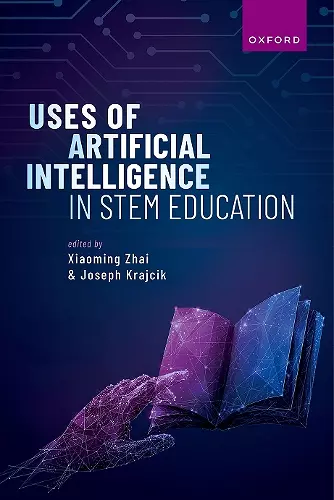Uses of Artificial Intelligence in STEM Education
Joseph Krajcik author Xiaoming Zhai author Joseph Krajcik editor Xiaoming Zhai editor
Format:Hardback
Publisher:Oxford University Press
Published:24th Oct '24
Currently unavailable, and unfortunately no date known when it will be back

In the age of rapid technological advancements, the integration of Artificial Intelligence (AI), machine learning (ML), and large language models (LLMs) in Science, Technology, Engineering, and Mathematics (STEM) education has emerged as a transformative force, reshaping pedagogical approaches and assessment methodologies. Uses of AI in STEM Education, comprising 25 chapters, delves deep into the multifaceted realm of AI-driven STEM education. It begins by exploring the challenges and opportunities of AI-based STEM education, emphasizing the intricate balance between human tasks and technological tools. As the chapters unfold, readers learn about innovative AI applications, from automated scoring systems in biology, chemistry, physics, mathematics, and engineering to intelligent tutors and adaptive learning. The book also touches upon the nuances of AI in supporting diverse learners, including students with learning disabilities, and the ethical considerations surrounding AI's growing influence in educational settings. It showcases the transformative potential of AI in reshaping STEM education, emphasizing the need for adaptive pedagogical strategies that cater to diverse learning needs in an AI-centric world. The chapters further delve into the practical applications of AI, from scoring teacher observations and analyzing classroom videos using neural networks to the broader implications of AI for STEM assessment practices. Concluding with reflections on the new paradigm of AI-based STEM education, this book serves as a comprehensive guide for educators, researchers, and policymakers, offering insights into the future of STEM education in an AI-driven world.
Accelerating AI capabilities is introducing both the opportunity and the requirement to reimagine education. Artfully blending discussions of technology and education, Uses of Artificial Intelligence in STEM Education is a seminal collection exploring the profound impact that AI will have on learning, instruction, and assessment. With themes of ethics, fairness, and inclusiveness woven throughout the book, this is a must-read for anyone wanting to understand how AI will fundamentally reshape the educational landscape * James Lester, Goodnight Distinguished University Professor in Artificial Intelligence and Machine Learning at North Carolina State University and Director of the National Science Foundation AI Institute for Engaged Learning *
This volume speaks to all science education scholars, offering a broad-ranging description of the field's current state regarding the integration of AI. Zhai and Krajcik use their wide-ranging experience to couple a comprehensive exploration of the topic with a critical evaluation and reflection on the progress to date and the significant challenges ahead. In light of the rapidly evolving nature of this phenomenon, the insights provided here are exceptionally important. * Kent J. Crippen, Irving and Rose Fien Endowed Professor of STEM Education, University of Florida *
Science educators have long pioneered the integration of emerging computing tools into the research and practices of STEM education... Zhai and Krajcik's foundational volume will accelerate critical thinking about and research-informed appropriations of frontier artificial intelligence advances into the richly interdisciplinary STEM education field. Our AI in Education scholarship benefits from their authors' contributions to the four themes of inquiry for the book's chapters—assessment, learning tools, teacher development, and ethics. * Roy Pea, David Jacks Professor of Education & Learning Sciences at Stanford University *
Artificial intelligence (AI) dominates much of educational discourse these days. This comprehensive edited volume enriches the discussion. The book presents the benefits and challenges of incorporating AI into STEM education, particularly streamlining teaching practices and allowing inquiry-based and individualized learning approaches. Throughout, researchers stress the importance of interdisciplinary and action-based research that enhances-not entirely replaces-the human aspects of education with AI. This is also an open-access book, facilitating engagement with its content to further this emerging field collaboratively. * E. G. Harrington, Choice *
ISBN: 9780198882077
Dimensions: 240mm x 160mm x 30mm
Weight: 1140g
624 pages